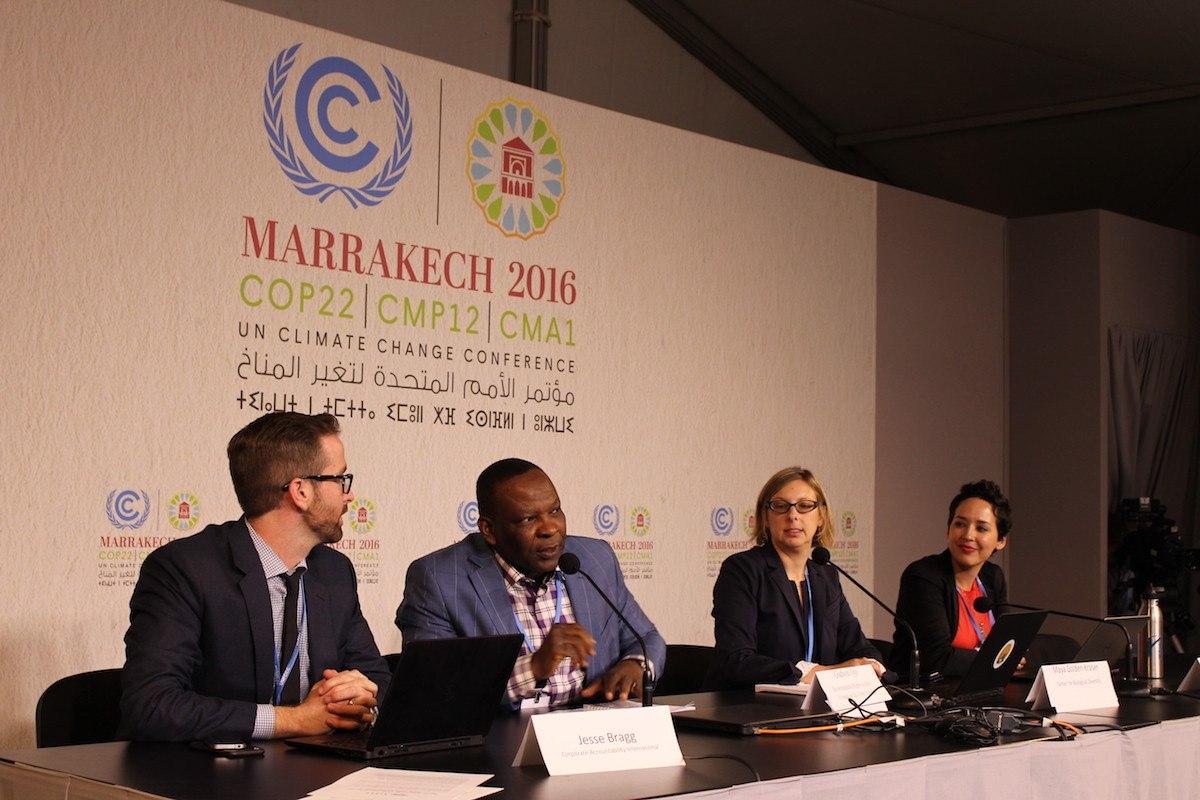
By Travis Holtby
What’s the difference between ExxonMobil and the Sierra Club? In the eyes of the U.N. Conference of Parties (COP), not too much. Under the rules governing the U.N.’s international climate change negotiations, both are treated as accredited third-party observers and granted the exact same rights and privileges.
A group led by the delegations of Nigeria, Ecuador and the nonprofit Corporate Accountability International (CAI) believe the idea of having the very international corporations responsible for anthropogenic climate change influencing these international negotiations represents an unacceptable conflict of interest.
Advocating a solution similar to the World Health Organization’s Framework Convention on Tobacco Control (FCTC), these groups want to break the hold of corporate capture on the COP, which they see as steering the climate change negotiation toward toothless agreements that keep fossil fuel companies’ profits high.
It is hard to argue against minimizing the power of corporate interests in climate negotiations, but using the exact framework as that of the FCTC may be too blunt an approach. Unlike tobacco, the world economy is completely dependent on fossil fuels, at least at present. Without a nuanced approach that carefully calibrates the transition to renewable forms of energy, the most vulnerable of the world’s population risk being further marginalized.
Few dispute the power of corporations to influence government affairs, particularly in developing countries. The resources they can bring to bear means corporations have close ties to the winning coalitions in most every nation. In and of itself, this is not a bad thing; private firms are fundamental to a market economy and as such should be taken into account in policy. The problem is that, more often than not, this power vastly overshadows the voices of other important actors, such as civil society and ordinary citizens.
This influence transcends national boundaries and affects international law as well. Since the 1992 Rio Earth Summit, there has been no hierarchy or differentiation between accredited observers in international climate change negotiations. From civil society to business, they have all been seen by the U.N. process as equal.
In their efforts to influence negotiations, the group of country delegations headed by Ecuador and Nigeria believe that corporations use four primary tools:
- Lobbying. This is the most direct approach and has quite a good return on investment: The CAI claims that for the $145 million the fossil fuel industry spent on lobbying in the U.S., it received $115 billion in subsidies. This lobbying influences international as well as national governance.
- Create business interest NGOs, or BINGOs. BINGOs operate independently of the corporations they represent, but may be funded or administered by them. The purpose of these organizations is to advocate for policies that benefit the industry or groups they represent. There are a number of BINGOs at COP22, including Business Roundtable, Competitive Enterprise Institute, and Business Europe, CAI says.
- Agency events. These are often fancy and expensive affairs designed to bring representatives from a given industry together with government officials to allow them interact and network.
- Direct partnerships with the U.N. These U.N. and corporate partnerships are a rather direct method, as they put corporate employees and executives into a direct working relationship with those of the U.N.
Again, the fundamental problem is not that business is influencing policy; that is a natural thing for any engaged societal actor to attempt. The problem is that the goals of the fossil fuel industry – high profits fueled by further extraction -- are fundamentally at odds with the action needed to combat climate change. This represents an irreconcilable conflict of interest.
However, this may be a harder issues to address than it has been in other forums. Unlike the WHO’s FCTC, which recognized a similar conflict of interest in allowing tobacco companies a seat at the table in determining national and international public health policy, the parties at COP have to take into account the fact that the world is dependent on fossil fuels -- at least for now.
Access to renewable energy is growing fast, but it still only represents a tiny fraction of the world’s power supply. This is especially true in developing countries, where coal-fired power plants are seen as the only realistic way to quickly connect the millions of people living in the dark to electricity.
It is easy for us in the developed world to advocate high taxes and other policies to disincentive the use of fossil fuels by increasing their cost. But we cannot forget that what would be a minor inconvenience for us could be an unacceptable burden for some of the most vulnerable people on the planet.
But this scenario also takes its logic to the extreme. The parties at COP are unlikely to adopt measures that would raise fuel costs to untenable levels, especially with the Nationally Determined Contributions (NDCs) to the Paris Agreement being decided by each individual country. It is also naïve to think that barring fossil fuel companies from the international climate change negotiations would stop them from accessing politicians in other venues. But recognizing and denormalizing such activity is an important symbol and step in the right direction.
The dangers posed by allowing extractive industries too much power over the negotiations –irreversible climate change -- far outweighs the possible dangers of pushing to keep these companies at arms distance from the negotiation process. However, the danger does still exist and, for something as important as averting catastrophic global climate change, a sophisticated and approached solution that is both based on science and takes into account the realities of all people on this planet is needed.
Image courtesy of the author
Travis Holtby is a graduate student in the School of Global Policy and Strategy at the University of California, San Diego.
TriplePundit has published articles from over 1000 contributors. If you'd like to be a guest author, please get in touch!














